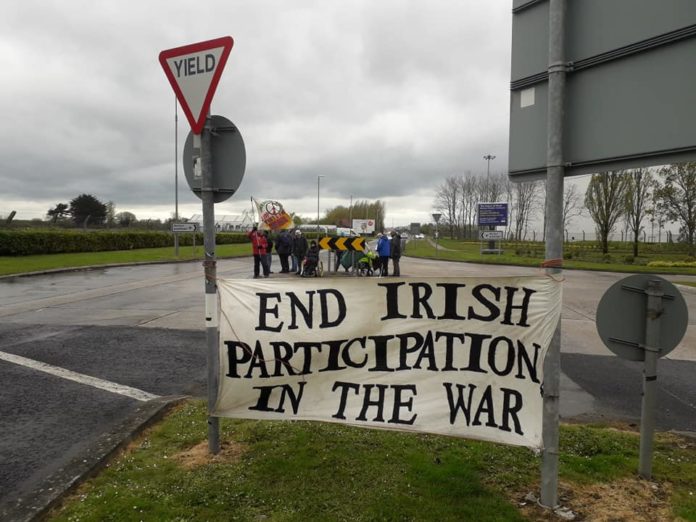Watching images from Kabul airport while listening to stories recounting two decade’s worth of windfalls for private contractors has prompted more and more people in the US to ask what exactly was the purpose of their country’s invasion and occupation of Afghanistan.
But, following the example set by Britain, Ireland is instead worrying about what this means for our place in the world.
Seeing suffering, torture, and executions, the Irish government has offered all of 150 humanitarian visas. The country’s press is concerned with the “embarrassment” of a member of the UN Security Council not having the capacity for an emergency airlift.
There is little discussion of how the role of Dublin’s Central Business District in facilitating international finance is mirrored by the role of Shannon Airport when empires need boots on the ground.
It’s unlikely that this Government will reflect on Ireland’s part in what is taking place right now in Afghanistan. But here’s four moments they should be thinking about.
1. Allowing US troops through Shannon Airport (2002 to present)

On 12 September 2001 the UN Security Council passed Resolution 1368 condemning the terror attacks that had taken place the previous day. Following the resolution, Bertie Ahern conveyed to the US Secretary of State that Ireland would waive its normal overflight and landing conditions, paving the way for US troops to transit through Shannon Airport on the way to Afghanistan.
Over 3 million US troops have travelled through Shannon on military contracted flights since 2002, according to ShannonWatch, with the majority destined for Iraq and Afghanistan.
As early as 2003, a High Court judge stated that, while it was not the place of the judiciary to interfere in Government policy, “there is an identifiable rule of customary law in relation to the status of neutrality, whereunder a neutral state may not permit the movement of large numbers of troops or munitions of one belligerent through its territory en route to a theatre of war with another.”
2. Refusing to check US military planes (2002 to present)

The Irish Times calculated that 25 chartered flights carrying explosives from the US to Afghanistan flew through Irish airspace between 2014 and 2019. But military contracted civilian aircraft aren’t the only option for US troops making their way to Afghanistan via Ireland.
The Minister for Transport can also provide permission for military aircraft to stop in or fly over Ireland. The Department releases the number of military overflights (734 in 2019) and landings (475 in 2019) but not anything about the cargo onboard.
Government after government have chosen to reject the calls to investigate the flights. Instead, they trust the diplomatic assurances of the US embassy that there are no arms, ammunition, or explosives on board, even when there is photographic evidence to the contrary.
3. Having Irish troops serving with NATO in Afghanistan (2002 to 2016)

226 members of the Defence Forces served in NATO-led missions in Afghanistan between 2002 and 2016, first as part of the International Security Assistance Force (ISAF) and then in the Resolute Support Mission (RSM).
When speaking about the deployments in response to a Parliamentary Question in May 2018, the then-Minister for Defence Paul Kehoe gave a bizarre statement, essentially saying Irish troops were in Afghanistan for lack of anything else to do: “There was a total of seven Defence Forces personnel deployed operationally in ISAF at any one time, some of whom on occasion happened to be members of the Army Rangers Wing. This provided those personnel with an opportunity to serve overseas, similar to personnel from other parts of the Defence Forces such as the Air Corps and Naval Service, which heretofore did not often get the opportunity of overseas service.”
4. Supporting the EU-Turkey refugee deal (2016)

In March 2016 the EU struck a deal with Turkey: anyone arriving irregularly in Europe would be “returned” to Turkey in exchange for €6 billion in EU funding. The majority of those seeking refuge in Europe at that time were from Syria, Iraq, and Afghanistan.
In a sign of what was to come, only hours after the deal came into effect, Turkey forcibly returned about 30 Afghan asylum seekers to Kabul without granting them access to an asylum procedure. Since then, the deal has trapped thousands seeking asylum in desperate conditions waiting on the Greek islands and prevented people from seeking asylum in Europe, in many cases following violence from European border guards.





